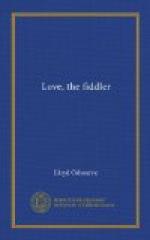George Raymond at forty-two was still in the auditor’s department of the New York Central. Time had wrinkled his cheek, had turned his brown hair to a crisp grey, had bowed his shoulders to the desk he had used for twenty-two years. His eyes alone retained their boyish brightness, and a sort of appealing look as of one who his whole life long had been a dependent on other people. As an automaton, a mere cog in a vast machine, he had won the praise of his superiors by his complete self-effacement. He was never ill, never absent, never had trouble with his subordinates, never talked back, never made complaints, and, in the flattering language of the superintendent, “he knew what he knew!”
In the office, as in every other aggregation of human beings, there were coteries, cliques, friendships and hatreds, jealousies, heart-burnings and vendettas. There was scarcely a man there without friends or foes. Raymond alone had neither. To the others he was a strange, silent, unknown creature whose very address was a matter of conjecture; a man who did not drink, did not smoke, did not talk; who ate four bananas for his lunch and invariably carried a book in the pocket of his shabby coat. It was said of him that once, during a terrible blizzard, he had been the only clerk to reach the office; that he had worked there stark alone until one o’clock, when at the stroke of the hour he had taken out his four bananas and his book! There were other stories about him of the same kind, not all of them true to fate, but essentially true of the man’s nature and of his rigid adherence to routine. He had risen, place by place, to a position that gave him a hundred and fifty dollars a month, and one so responsible that his death or absence would have dislocated the office for half a day.
“A first-class man and an authority on pro ratas!”
Such might have been the inscription on George Raymond’s tomb!
His mother was still alive. She had never entirely regained her health or her strength, and it took all the little she had of either to do the necessary housekeeping for herself and her son. Thin to emaciation, sharp-tongued, a tyrant to her finger-tips, her indomitable spirit remained as uncowed as ever and she ruled her son with a rod of iron. To her, Georgie, as she always called him, was still a child. As far as she was concerned he had never grown up. She took his month’s salary, told him when to buy new shirts, ordered his clothes herself, doled out warningly the few dollars for his necessaries, and saved, saved, continually saved. The old woman dreaded poverty with a horror not to be expressed in words. It had ruined her own life; it had crushed her son under its merciless wheels; in the words of the proverb, she was the coward who died a thousand deaths in the agonies of apprehension. She was one of those not uncommon misers, who hoard, not for love of money, but through fear. She had managed, with penurious thrift and a self-denial almost sublime in its austerity, to set aside eight thousand dollars. Eight thousand dollars from an income that began at sixty and rose to a little under three times that amount! Eight thousand dollars, wrung from their lives at the price of every joy, every alleviation, everything that could make the world barely tolerable.




